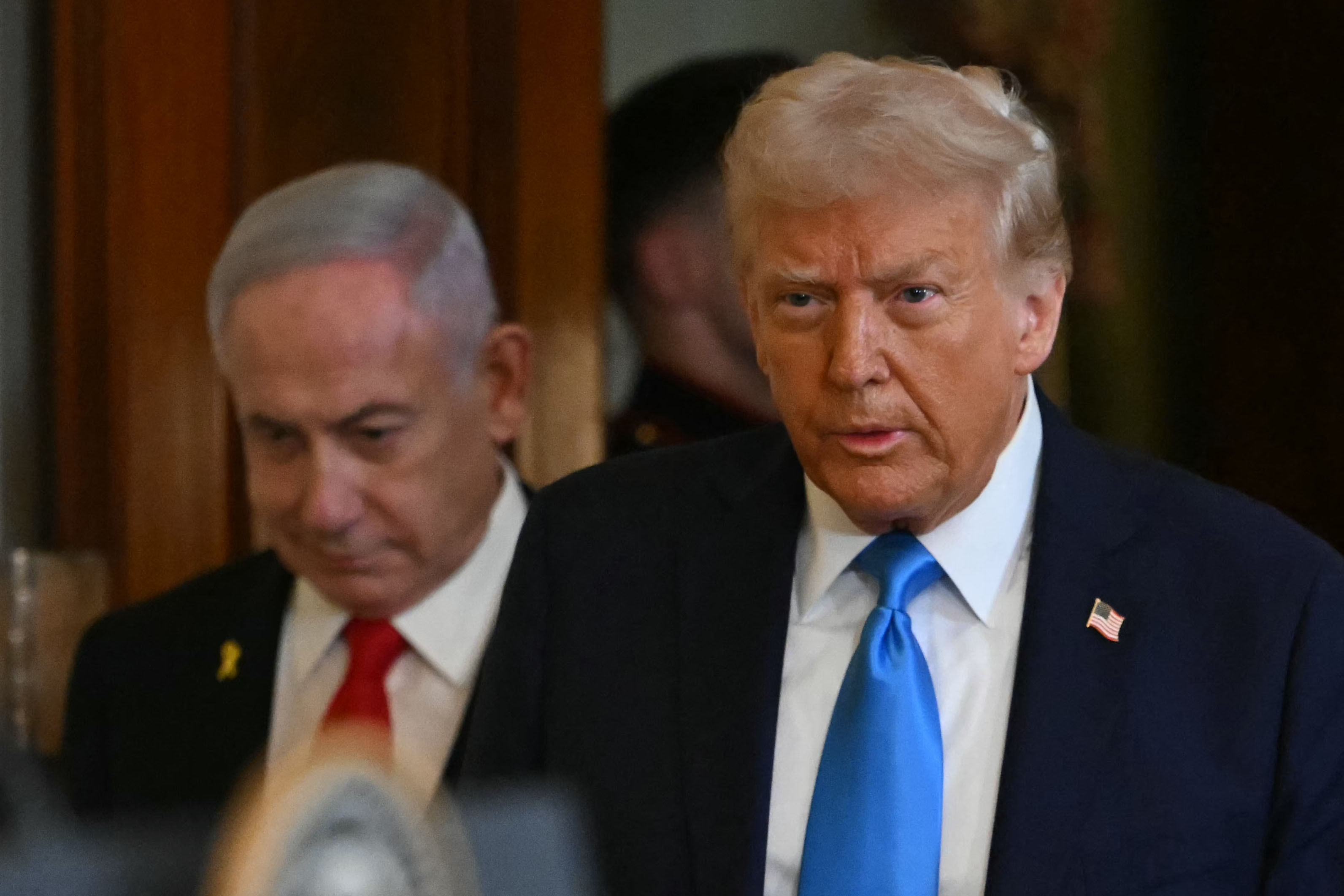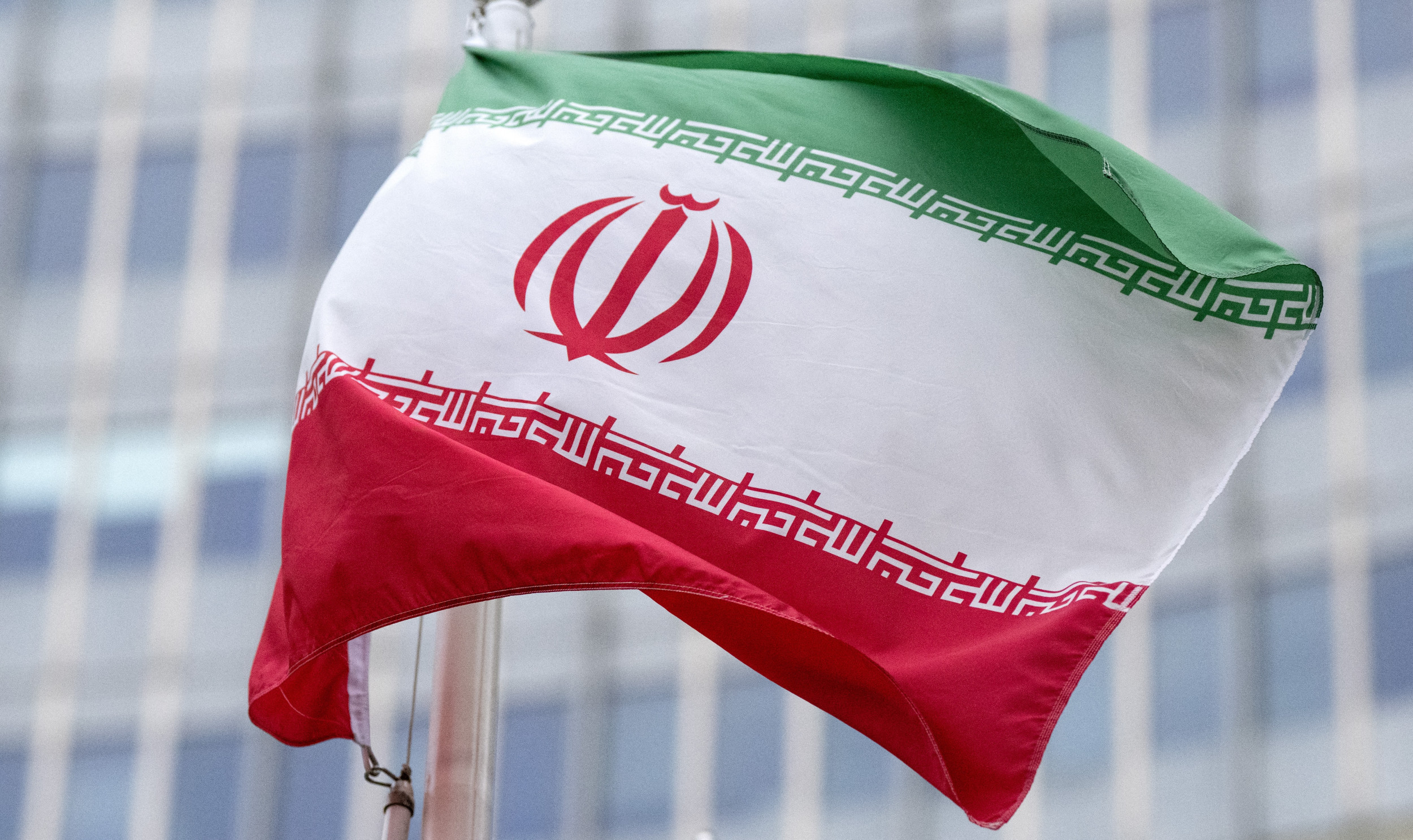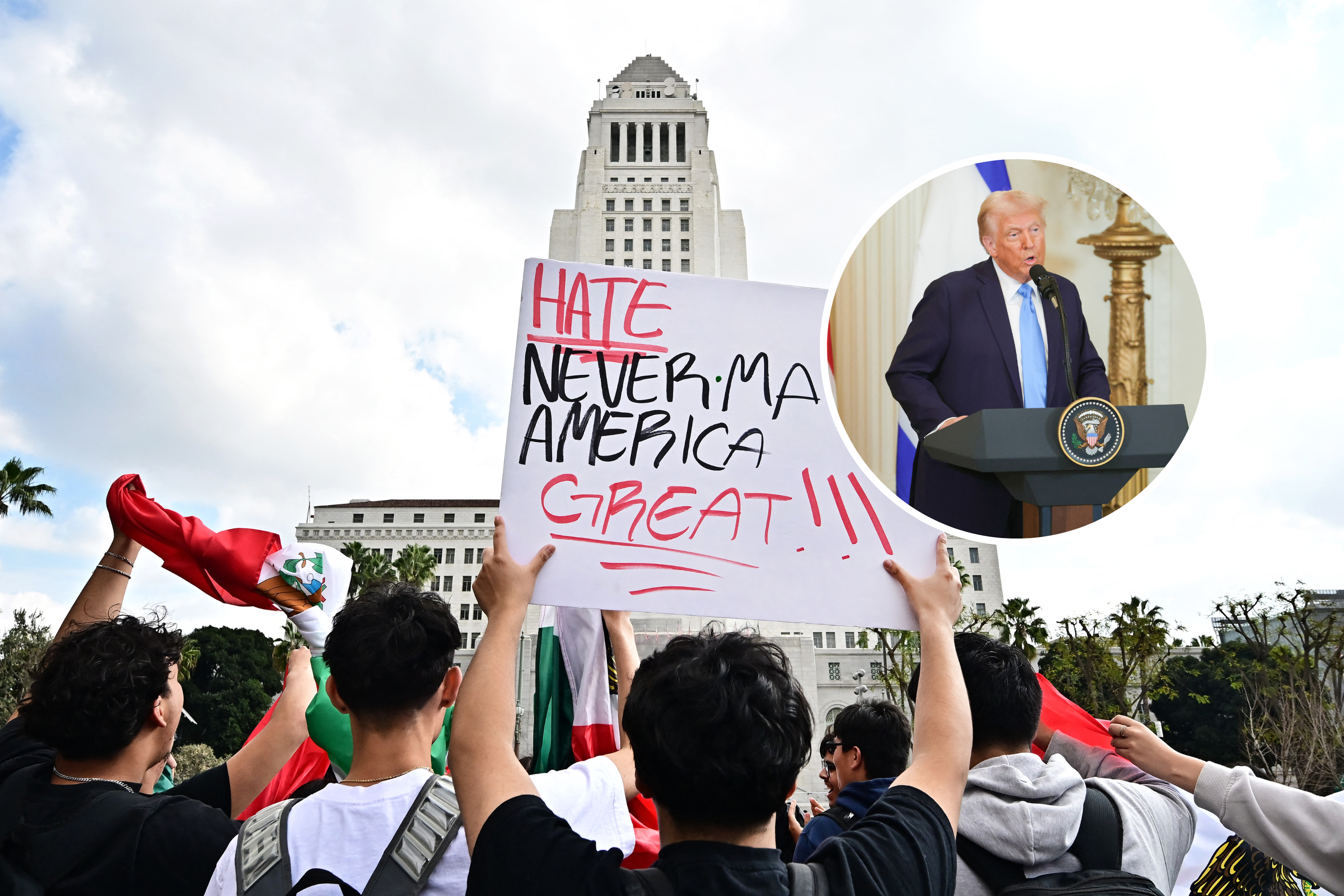By
Based in his hometown of Staten Island, New York City, Tom O'Connor is an award-winning Senior Writer of Foreign Policy and Deputy Editor of National Security and Foreign Policy at Newsweek, where he specializes in covering the Middle East, North Korea, China, Russia and other areas of international affairs, relations and conflict. He has previously written for International Business Times, the New York Post, the Daily Star (Lebanon) and Staten Island Advance. His works have been cited in more than 1,800 academic papers, government reports, books, news articles and other forms of research and media from across the globe. He has contributed analysis to a number of international outlets and has participated in Track II diplomacy related to the Middle East as well as in fellowships at The Korea Society and Foreign Press Center Japan. Follow @ShaolinTom for daily news on X and his official Facebook page. Email t.oconnor@newsweek.com with tips or for media commentary and appearances. Languages: English and Arabic Ellie Cook is a Newsweek security and defense reporter based in London, U.K. Her work focuses largely on the Russia-Ukraine war, the U.S. military, weapons systems and emerging technology. She joined Newsweek in January 2023, having previously worked as a reporter at the Daily Express, and is a graduate of International Journalism at City, University of London. Languages: English, Spanish.You can reach Ellie via email at e.cook@newsweek.com.
Senior Writer, Foreign Policy & Deputy Editor, National Security and Foreign Policy
President Donald Trump soared into his second nonconsecutive term at the White House on the crest of a temporary ceasefire deal that has the potential to put an end to the Israel-Hamas conflict ravaging the Gaza Strip since October 2023.
Trump repeatedly took credit for the win throughout the pomp and circumstance of his inauguration day. He argued that outgoing President Joe Biden had failed to secure the proposal first outlined last May until the incoming administration's influential Middle East envoy, Steve Witkoff, scored a breakthrough at the negotiating table just days before the presidential hand over. Israeli sources have also testified to Newsweek the decisive role played by the Trump team, whose presence appeared to push all sides, including Israeli Prime Minister Benjamin Netanyahu, across the finish line.

Having also overseen the extension of a truce between Israel and the Hezbollah movement in Lebanon after less than a week in office, Trump has made early strides toward enforcing his declared "peace through strength" doctrine. Yet the new administration, already embroiled in a series of other sweeping policy initiatives at home and across the Western Hemisphere, must double down on its Middle East maneuvers to navigate an even more precarious playing field if it seeks to sustain the calm and potentially expand upon this hard-won diplomatic victory.
"Prime Minister Netanyahu did not want to say no to Trump, the Qataris and Egyptians wanted to show they could deliver for him, and they very likely persuaded Hamas that it was in its interests to have a ceasefire now because Trump would not want the war to resume once he was in office," veteran U.S. diplomat Dennis Ross, who serves today as a distinguished fellow at The Washington Institute for Near East Policy, told Newsweek.
"Now he is president again," Ross, a pivotal player in the early 1990s negotiations that led to the landmark Israeli-Palestinian Oslo accords and Israel-Jordan peace treaty, added. "And if he feels this is his agreement—and he does not want the war to resume—his leverage will again need to be applied."

A Formidable Task
While Trump has put on full display his willingness to apply pressure to traditional U.S. allies, from NATO to the Americas, the situation in Israel presents a complex challenge. Netanyahu's decision to ultimately move forward with the first phase of the ceasefire agreement after it was already announced by all other negotiating parties, including Trump, came amid backlash from far-right factions critical to maintaining his ruling coalition. Among the Israeli premier's two ultraconservative cabinet members, National Security Minister Itamar Ben-Gvir and Finance Minister Bezalel Smotrich, the former has already resigned in protest.
Netanyahu has also vowed to continue the war until his top three objectives are achieved—releasing all remaining hostages seized during the Hamas-led surprise attack on October 7, 2023, in which about 1,200 Israelis were killed and about 250 taken hostage, that sparked the conflict; eliminating Hamas as a functioning military and political entity; and rendering Gaza incapable of posing any future threat to Israel.
The U.S.-drafted deal outlines a series of swaps between hostages held by Hamas and Palestinians imprisoned by Israel in exchange for a six-week cessation of hostilities and limited Israeli withdrawal from Gaza in the first phase, followed by further trades, an Israeli military exit and the reconstruction of Gaza. As it has been publicly presented, at no point does the deal address the future governance of Gaza.
Establishing a viable two-state solution brings with it an even more formidable set of challenges that have racked successive U.S. administrations for decades, even during times of relative peace and popularity for the initiative. But a new incentive has emerged, with Saudi Arabia identifying this process as a prerequisite for normalizing relations with Israel, another leading objective for Netanyahu and Trump, who oversaw the historic Abraham Accords in 2020, ultimately bringing the United Arab Emirates, Bahrain, Sudan and Morocco into the fold. Previously, Egypt and Jordan were the only states to sustain a break from the Arab boycott of Israel.
Trump's unique relationship with both Netanyahu and Saudi Crown Prince Mohammed bin Salman makes the prospect of expanding upon his Middle East peacemaking legacy all the more tantalizing. Such an initiative could only be conceivably launched once the fate of Gaza is clearly defined.

Despite Hamas suffering heavy casualties among the roughly 47,500 Palestinians killed in the conflict—as counted by the health ministry in Gaza—including the loss of its core leadership, the Islamist militant group continues to wield a visible armed presence throughout the embattled territory.
Ross spoke of serious discussions for postwar Gaza that had been held under Biden, who also asserted that Hamas could not be allowed to lead.
"An interim or transitional administration of 18 to 24 months with Arab (Emirati, Egyptian, Moroccan) and international involvement has been discussed, is a possibility and could be responsible for restoring commercial activity, daily management and law and order," Ross said.
"That administration would also preside over the rehabilitation and reconstruction process," he added. "Just as contractors are now checking those Gazans that are moving from the south back to the north, security contractors can play a role in law and order and the distribution of humanitarian assistance."

Eventually, according to this plan, the territory could be restored to the Palestinian National Authority (PA), the West Bank-based administration established during the Oslo accords and dominated by the secular Palestine Liberation Organization's (PLO) Fatah party. The PA briefly administered Gaza in partnership with Hamas following the Israel Defense Forces' (IDF) 2005 withdrawal after more than four decades of occupation. Yet Hamas' victory in the last-ever Palestinian elections held in 2006 gave way to infighting and Hamas' eventual seizure of the territory in 2007.
But the PA, led by 89-year-old President Mahmoud Abbas for two decades, faces its own internal crisis, as polls consistently show a decline in popularity against Hamas and allegations of widespread corruption. The PA's legitimacy in the West Bank is further challenged by renewed IDF operations commenced shortly after the ceasefire being reached in Gaza.
"Palestinians do need to be part of this process, but real reform of the Palestinian Authority is essential," Ross said. "The PA is too weak, too corrupt and too lacking in credibility to play a meaningful role now but as it credibly reforms, it should gradually and increasingly do so."

"The necessary reform will not happen without an active Trump administration role, with the leading Arabs insisting that PA reform is a necessary condition for the Palestinian Authority, over time, assuming responsibility again in Gaza," he stated.
Senior PLO officials have previously expressed to Newsweek their openness to reestablishing the PA's governance over Gaza, but they have consistently argued that only Palestinians, not the Israeli government, should be able to determine that governance. Diana Buttu, a former PLO spokesperson and legal adviser to Israeli-Palestinian peace negotiations, reaffirmed this position.
"On the issue of what the future Palestinian government looks like, the last country to be able to determine what that government looks like is Israel," Buttu told Newsweek. "The fact that people are speaking as though Israel did not just finish 15 months of genocide is very disturbing to me."
Both the U.S. State Department and the Israeli government reject charges that Israel is committing genocide in Gaza.
Buttu argued that "the main issue is for Palestinians to finally be able to determine their own future, and this can only be done through elections, and by ensuring that Palestinians are finally free."
She warned: "Short of that, any other formula is going to be a continuation of Israeli military occupation, and as we have seen in all military occupations around the world, when there is occupation, there is resistance."

A Radical Solution
Hamas, initially an offshoot of the Muslim Brotherhood movement that originated out of Egypt, first emerged in Gaza in the 1980s in the midst of Israel's extended occupation that began with its victory over Arab states in the 1967 Six-Day War. Even with many of its founding members slain over the years, the group has displayed a capacity to replenish its ranks under heavy IDF scrutiny.
Other influential Palestinian factions in Gaza, such as Islamic Jihad and the Popular Resistance Committees, have shown no greater willingness to coexist with Israel and have actively participated in operations since October 2023.
Trump, like Biden and Netanyahu, has stated that Hamas could no longer lead in Gaza without explicitly outlining how they could be effectively uprooted. The former real estate mogul, who has often focused on Gaza's development prospects, did, however, propose a radical solution for the territory's reconstruction that could ostensibly address this issue, albeit garnering considerable controversy.
"You're talking about a million and a half people, and we just clean out that whole thing," Trump told reporters aboard Air Force One on January 26 following a call with King Abdullah II of Jordan and in anticipation of a planned call with President Abdel Fattah el-Sisi of Egypt.
The stunning suggestion, which would entail one of the largest population transfers in modern history, was met with immediate rejection from the two neighboring Arab nations. Hamas, which had initially expressed to Newsweek cautious optimism toward Trump's inaugural commitments to lasting peace in the Middle East, also slammed this idea.
"The Palestinian people in the Gaza Strip have endured death and destruction over 15 months in one of humanity's greatest crimes of the 21st century, simply to stay on their land and homeland," Hamas Political Bureau member and spokesperson Basem Naim said in a statement shared with Newsweek. "Therefore, they will not accept any proposals or solutions, even if seemingly well-intentioned under the guise of reconstruction, as proposed by U.S. President Trump."

"Our people have thwarted all plans of displacement and alternative homelands over decades, and they will also reject such projects," he continued. "We affirm that our people are capable of rebuilding Gaza even better than before, provided that the blockade on the region is lifted."
Netanyahu's office declined Newsweek's request for comment. The White House did not return a response to Newsweek's inquiry.
Trump went further during a joint White House press conference with Netanyahu on February 4, telling reporters: "We're going to take over that place, we're going to develop it, create thousands and thousands of jobs. And it'll be something that the entire Middle East can be very proud of."
Trump said he believed such a move would bring "stability to that part of the Middle East and maybe the entire Middle East."
Netanyahu welcomed the idea, calling it, "something that could change history and it's worthwhile really pursuing this area."
Hamas senior leader, Dr. Sami Abu Zuhri, responded to the comments, telling Newsweek: "We reject Trump's statements in which he said: 'the residents of the Gaza Strip have no choice but to leave,' and we consider them a recipe for creating chaos and tension in the region.
"Our people in the Gaza Strip will not allow these plans to pass, and what is required is to end the occupation and aggression against our people, not to expel them from their land."
Other nations have also emerged in reports regarding expelling Palestinians from Gaza. Both Indonesia, identified by an unnamed Trump administration official as a potential destination for displaced Gazans in an NBC News report, and Albania, mentioned by sources cited by Israel's Channel 12 outlet, both shot down the alleged idea.
But the proposal won resounding support among the Israeli far-right that had so far expressed skepticism over Trump's peacemaking foray. Both Ben-Gvir and Smotrich had already declared Trump's election victory in November as a pathway toward the annexation of the West Bank.
"Cabinet Ministers Smotrich and Ben-Gvir's agenda and dream has been to transfer Palestinians from the area to other countries. Smotrich has even revealed that he is working on an 'operational plan' in support of this idea," Alex Mintz, founder of Israeli artificial intelligence company Decision Advantage.ai and a senior professor at Israel's Reichman University, told Newsweek.
"The greater issue is going to be whether [Trump] pushes for the ethnic cleansing of Gaza by pressing Jordan and Egypt to take in Palestinian refugees from Gaza," Buttu said. "This is all to say that while President Trump appears to be taking a hands-off approach by saying that 'this is their war,' the actions of the United States will dictate whether this goes to the second and third phases."

The Long Road Ahead
Experts have also sought to address the issue. A report released by the Rand Corporation think tank on January 28 laid out the myriad problems bound to trip up successful peace talks between Israel and the Palestinians, as they have done for decades, particularly as there are currently "few credible Israeli or Palestinian partners to exert leadership for peace." This is owing both to Hamas' militant stance and the decay of PA credibility.
But the report, authored by nearly a dozen analysts, attempted a tone of some optimism that agreements could finally be reached in the "seemingly irreconcilable" conflict that was compared to seven case studies ranging from the decades-long Northern Irish "Troubles" to the bloody Balkan wars that accompanied the collapse of the former Yugoslavia.
"It may not be enough that Israel negotiates only with the Palestinians that they favor; if the Northern Ireland or Bosnia cases are any indication, a peace that can hold will require negotiating with all the relevant parties—including paramilitary groups with which the Israelis may prefer to not negotiate," the report stated in one section. Elsewhere, it acknowledged that the Hamas-led attack in October 2023 has pushed Israeli public opinion further away from a two-state solution.
For any kind of lasting peace between Israel and Palestinians, there needs to be a firm path to Palestinian statehood, backing from both Israelis and Palestinians more widely and a geographic mapping out of a Palestinian state that is economically viable, while securely linking chunks of the West Bank to Gaza, the think tank said.
"It might not be a PA reformed that ends up taking control of a Palestinian state, but a new body that may or may not have old PA faces in it," former U.S. Ambassador Charles P. Ries, adjunct senior fellow at Rand and the report's lead author, told Newsweek.
"What's important is that they have legitimacy, and they're able to articulate to Palestinians how they can make life better for them, and they can negotiate, then, with the support of the international community, with the Israelis. However, we are still not really at the stage where Israeli and Palestinian societies are ready for a lasting peace."
The swelling numbers of Israeli settlers in the West Bank will be a thorn in the side of negotiations, the report said, as will fraught talks on who controls Jerusalem. The city at the center of centuries of warfare is claimed by both Israelis and Palestinians as their capital and the United Nations continues to recognize the city as divided despite Israel's disputed annexation of the east 45 years ago.
A Palestinian "entity," which would later morph into a fully fledged state, would need a strong law-enforcement presence, but would be blocked from having a significant military force with heavy armor or artillery, according to the report. Following the deployment of "a special multinational coalition authority" involving regional and Western nations, Palestinians would be enfranchised to choose their own leadership based on a constitution committed to peace, the report suggested.

Meanwhile, Gaza—largely destroyed by intensive Israeli bombing and ground operations—would need to be rebuilt and overhauled, including slotting in new financial, health care, education and judicial systems, the think tank said.
"Rebuilding Gaza's devastated physical and social infrastructure will be crucial to navigating the pathway to durable peace," the think tank added. "A decisive turn toward peace cannot be managed if physical and social structures remain devastated and hope elusive."
All of these proposals would need to be bracketed by countries elsewhere in the region and further afield; countries like Saudi Arabia, Egypt, Jordan and the United Arab Emirates would need to step in, including to ink new trade agreements with Israel. The U.S., U.K., European Union nations and even China would have a role in propping up peace, according to the report.
"International actors will be decisive in pursuing the pathway to a durable peace, as their influence has, at times, been a contributor to sustaining the conflict," the think tank said.
Observers believe Trump will play an especially critical role in mapping out the next steps at this crucial moment for the Israeli-Palestinian conflict. Dahlia Scheindlin, a Tel Aviv-based political analyst and fellow at The Century Foundation think tank, told Newsweek that "it is a commonly held view here that only Trump can ensure that the ceasefire goes through or possibly move ahead to other agreements."

"I assume he can play an effective role, as we've seen for reaching the agreement," she said. "However, the Biden administration could have pushed through a ceasefire deal if it had been willing to use more of the leverage that any U.S. president has."
Scheindlin was less confident, however, about the priority to which Netanyahu and his allies assigned establishing ties with Saudi Arabia, particularly if such a move demanded undesirable concessions on the Palestinian side, even though signaling from the Israeli government before the October 7 attacks suggested a deal could be near.
"I don't think the Israeli government views Saudi normalization as a top priority," Scheindlin said. "It was always a prize that would bring benefits, not a necessity.
"The steps that could be taken would involve committing substantively to a final status political resolution resulting in Palestinian statehood next to Israel, and the Israeli policy changes needed to get there," she added. "I view that as very much in Israel's interests—but the Israeli government does not agree with me."

![]()
fairness meter
fairness meter
Newsweek is committed to journalism that's factual and fair.
Hold us accountable and submit your rating of this article on the meter.
Newsweek is committed to journalism that's factual and fair.
Hold us accountable and submit your rating of this article on the meter.
Click On Meter To Rate This Article
To read how Newsweek uses AI as a newsroom tool, Click here.




















 English (US) ·
English (US) ·